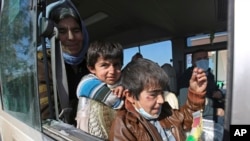“First, they took all the men...” Rakhda said, beginning a tale familiar to other victims of the Islamic State.
In mid-August, Rakhda’s village, the Yazidi enclave Kocho in northern Iraq, was surrounded by militants. Nearby in Sinjar, US fighter jets were pounding IS positions, but it didn’t deter the fighters outside Kocho. They entered, separated out the men, and killed them.
Then they divided up the rest – young women, old women and men, families with small children. Fighters took Rakhda, her son and daughter first to Tal Afar, then across the Syrian border to Raqqa. There, her status became clear - not just a prisoner, but a slave.
“They were trading us among themselves,” she said in a phone interview with VOA's Kurdish Service. “When they were tired of us, they sold us to someone else.”
Eventually, Rakhda, her seven-year-old daughter Rula and three-year-old son Hoshyar were bought by a man called Abu Jihad, who was one of IS’s foreign recruits – a Chechen. Abu Jihad put them to work.
He brought powdered sugar and another chemical, likely potassium nitrate, which Rakhda boiled together to make rocket fuel. “For five months, I was making ten to twelve rockets a day,” she said, packing parts of the rockets with the volatile mixture. Her children were forced to help. “When anyone made a mistake making rockets, he beat them with cables.”
Forced to Convert
Sunni Muslims may be the most numerous victims of the Islamic State, which tolerates only its own puritanical brand of Sunni Islam. IS also kills Shi’ites as heretics, while Christians and Jews are marked as infidels.
But the militants view the Yazidis as something else – a group whose blend of various faith traditions is idolatrous, justifying a particularly brutal response. In a public relations blitz, IS called its treatment of Yazidis a revival of “spoils of war,” using Koranic verses to support rape, enslavement and murder.
Or as U.N. investigators chose to describe it, possibly genocide.
Those they don’t kill, IS tries to convert.
When Abu Jihad was not making Rakhda and her children build weapons that could be used against their own people, he forced them to recite the Koran.
Three-year-old Hoshyar fumbled in his attempts, and Abu Jihad threatened to cut off his head.
With those words hanging over her, seven-year-old Rula learned quickly and can still recite Arabic phrases she, as a Kurdish speaker, never did understand. Now, she said, “I want to forget.”
Escape
Despair washed over Rakhda, especially when her children were beaten. “Many times I wanted to kill myself,” she said.
Instead, she and her children escaped. In early April, Abu Jihad took the rockets and headed for a battle on the far side of Raqqa. With the help of a friend’s uncle, Rakhda and her children made their way stealthily to the Euphrates River, which runs through the city and on to a boat bound for Kobani in the north. From there, the family made it back home.
But home, Rakhda said, was not there. “My family – my mother, father, brother and my in-laws – all are missing.”











